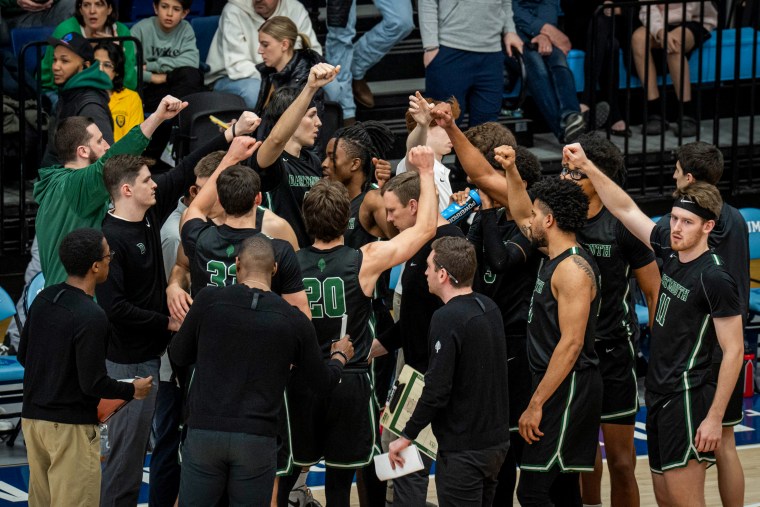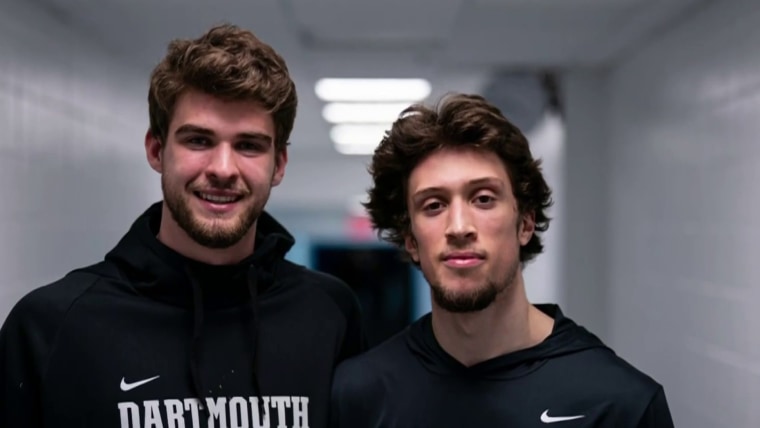The Dartmouth College men's basketball team voted 13-2 Tuesday afternoon to become the first labor union for college athletes.
The vote could mean a huge shakeup for the NCAA’s model, which allows college athletes to financially benefit from their role on teams only through their names, images and likenesses.
Dartmouth players Cade Haskins and Romeo Myrthil began the initial push for unionization via a petition in September. They celebrated the results of the historic election in a statement.
"It is self-evident that we, as students, can also be both campus workers and union members," they said. "Dartmouth seems to be stuck in the past. It’s time for the age of amateurism to end."
They told NBC News Now that they had to take on campus jobs to sustain their finances while they were student-athletes because they don't get any benefit or stipend despite the full-time commitment.
The Dartmouth team voted to join SEIU Local 560, which represents service employees in Hanover, New Hampshire. The union's local and international presidents congratulated the team on its vote.
"The Ivy League is where the whole scandalous model of nearly free labor in college sports was born and that is where it is going to die," SEIU International President Mary Kay Henry wrote. "But this victory is about way more than sports, it’s about people who need a union getting one."
The National Labor Relations Board paved the way for the union vote on Feb. 5, when Regional Director Laura Sacks ordered an election for the team.
“Because Dartmouth has the right to control the work performed by the Dartmouth men’s basketball team, and the players perform that work in exchange for compensation, I find that the petitioned-for basketball players are employees within the meaning of the [National Labor Relations] Act,” Sacks said in a statement.
Dartmouth pushed back against the ruling, filing an appeal to postpone the election or impound the ballots. In the motion, which the NLRB denied Tuesday, the university argued that the athletes are "students first and athletes second" and that they participate in college basketball to further their educational aims, like all students who participate in extracurricular activities.
Cornell University sports law professor Michael L. Huyghue said the classification of college athletes as regular students is a “mockery,” because it neglects the millions of dollars colleges are paid for television contracts, marketing rights and ticketing sales.
“We’ve just reached a point where the antitrust laws are suggesting universities don’t have a right to capitalize on all that revenue,” he said.
Dartmouth still has five days to file an objection to the union election. The NLRB decision can be appealed up to the Supreme Court.
The university said in a statement Tuesday that unionization is not appropriate for the team's players because it is inaccurate to classify them as employees simply because they play basketball.
"For Ivy League students who are varsity athletes, academics are of primary importance, and athletic pursuit is part of the educational experience," it said.
Helen Drew, a professor of sports law at the University of Buffalo, said that neglects the divide between college athletes and their peers in terms of workload.
“A significant number of D1 athletes are anxious, depressed and unhappy,” Drew said, referring to the NCAA’s Division I classification. “We should be empowering the athletes to have a better place.”

It is not the first time a college athletics team has made a bid to be recognized as employees. In 2014, Northwestern University's football team sought union status from the NLRB.
Although a union election was held, the ballots were destroyed because the NLRB ruled the following year that the prospect of mixing union and nonunion teams in college sports could create competitive imbalances on the field.
But Huyghue said that argument overlooks that there is already an imbalance in competition and resources at every university in terms of how teams travel and have access to equipment, medical care, training, etc.
"We don't have an equitable system that says every university has to have the same amount of money spent on its programs," Huyghue said. "It's the haves and have-nots, and that has always been the case in college sports."
Drew and Huyghue said they expect student-athletes at other colleges, particularly within the Ivy League, to petition for unionization in light of the vote.

